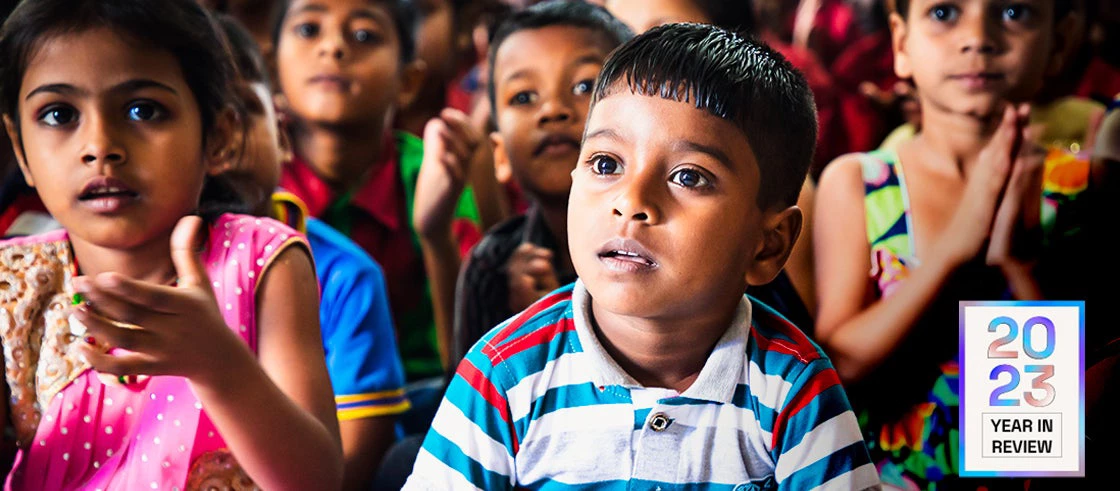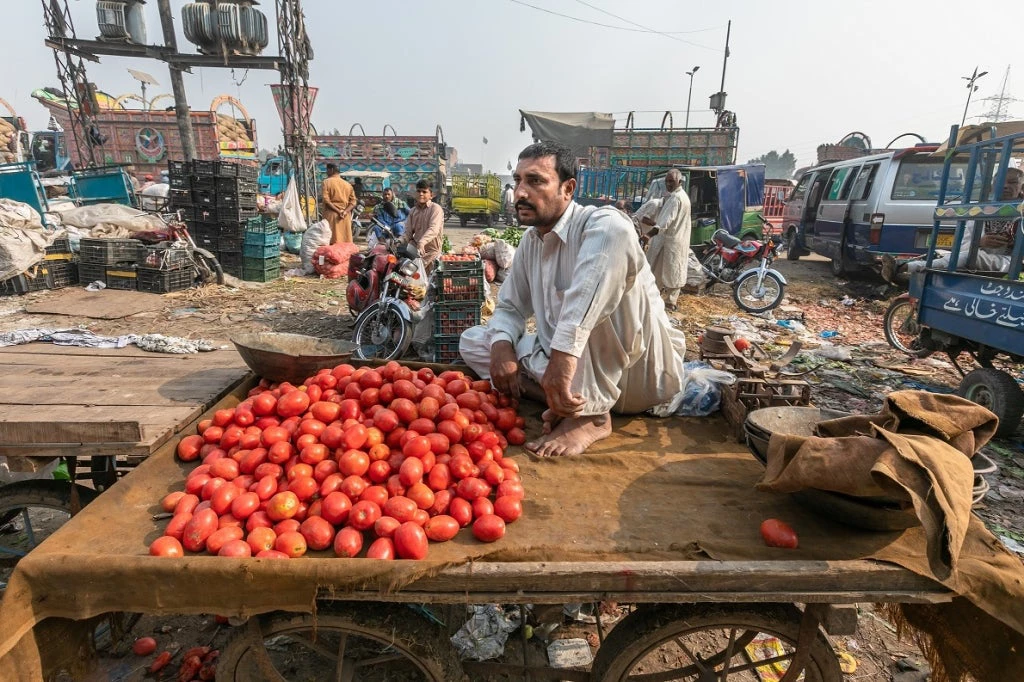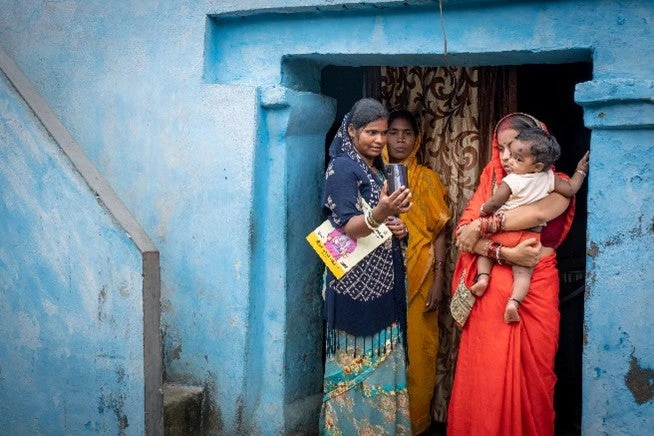 Young school children in Dhaka, Bangladesh.
Young school children in Dhaka, Bangladesh.
2023 has been a year of recovery for South Asia. The region has been hit hard by a series of extreme shocks in recent times: the pandemic, multiple economic crises, ongoing political turmoil and devastating natural disasters. And countries have a long way to go to attain their development goals. But these crises have also shown the resilience and innovation of the people in the region, from a young innovator in Nepal who used mobile apps to expand her business during the pandemic to a road maintenance worker in Bangladesh who now earns enough to support her granddaughters’ education to women’s self-help groups in India spreading knowledge on health and nutrition.
Our blogs in 2023 spotlight these stories and explore issues critical to the region such as air pollution, climate change, women’s empowerment, energy transition, and digital development. Here’s a look back at South Asia’s year in 10 blogs.
1. A united South Asia can beat air pollution
South Asia is a global hotspot of air pollution, home to 37 of the 40 most polluted cities in the world. Air pollution causes nearly 2 million premature deaths across the region and incurs significant economic costs. Since air pollution travels long distances and gets trapped in large airsheds, it is only through cooperation at the provincial, state, and regional levels that South Asia can curb air pollution. Drawing on a World Bank report, Martin Raiser’s blog stresses the need for unity to end air pollution - a call to action from our campaign Together for Clean Air in South Asia.
2. Why the Maldives 5 MW solar project is a game changer
Projected to lose 80 percent of its land over the next few decades, Maldives has strengthened its commitment towards climate change and renewable energy targets and aims to become net-zero by 2030. Guangzhe Chen, Amit Jain, and Simon Stolp write about how the inauguration of a World Bank-supported 5 MW solar project has been a game changer in Maldives’ energy transition journey, which is now seeing unprecedented interest from international investors and helping establish the Maldives as an investment destination for sustainable projects.
3. Empowering women through a #DigitALL Nepal
Read about how 17-year-old Nabina Yadav in Nepal kept her vegetable stall business afloat during the pandemic by using messaging and digital payment apps. Nabina’s story illustrates how digital technologies can help even the smallest businesses thrive. This blog by Aayushma K.C. emphasizes that for women to more effectively participate in the fast-digitizing economy, we need to ensure access to technology, skills, and digital financial services.
4. Pakistan: Economic recovery, inclusive growth require bold reforms
Pakistan is at a critical decision point, with years of inefficient policies culminating in an economic crisis that has hit ordinary Pakistanis harder than ever before. However, World Bank analysis shows that, with the right policies in place, Pakistan could achieve upper-middle income status by 2047. Tobias Haque writes about the major reforms that are urgently required to navigate the country towards a brighter, more prosperous and more sustainable future.

5. The road to jobs and dignity: Bangladeshi women are building a new future
In Erisha Suwal and Jayati Sethi’s blog, meet Bedana Begum, one of the 795 women employed by the local government engineering department as part of the World Bank-financed Western Economic Corridor & Regional Enhancement (WeCARE) Program. The program helps provide efficient, safe, and resilient connectivity along a section of the regional transport corridor and reduce post-harvest losses. It has helped hundreds of women like Bedana not only meet their day-to-day expenses but also accumulate savings and become more self-sufficient.
6. Rising to the challenge: Promoting livelihoods in Afghanistan by engaging the private sector
In countries challenged by fragility, conflict, and violence, the private sector is key to accelerating economic growth. Since the Taliban took over Afghanistan in 2021, much of the hard-won progress was threatened. Tahir Akbar and Kabeer Dawani write about how the World Bank is supporting the revival of the local private sector in Afghanistan’s construction sector through the strengthening of community resilience and livelihoods, and the challenges it faces in doing so.
7. Stranded jobs? The energy transition in South Asia’s labor markets
In the context of a rapid global energy transition, how will moving away from fossil fuels impact jobs and workers in South Asia? Research from our latest South Asia Development Update shows that the energy transition could leave many workers stranded in lower-wage jobs in declining industries. Margaret Triyana highlights the policies that countries will need to adopt to protect vulnerable workers.
8. India: Improving the health and nutrition of rural women and children in Bihar
Almost a third of rural women in Bihar’s Jehanabad district are illiterate, but thanks to the World Bank-supported JEEViKA program, many now talk convincingly about complex dietary concepts that could perhaps be foreign to many in urban India. Deepika Anand, Mohammad Anas, and Raj Ganguly visited the district and report on how the program has visibly transformed the nutritional awareness of millions of women self-help group members across the state and how the women’s newly acquired knowledge is bearing fruit.

9. Sri Lanka’s crisis offers an opportunity to reset its development model
In Sri Lanka, the recent economic collapse, political instability and increasing climate-induced disasters have devastated lives and livelihoods especially for the poorest and most vulnerable. But with every crisis comes an opportunity. Martin Raiser writes how this pivotal moment is a chance for Sri Lanka to reset its development model towards green, resilient, and inclusive growth.
10. From Labs to Local: How Global Innovation is Building Local Resilience in South Asia
In the state of Uttarakhand in India, there are Himalayan villages that are too high and remote for roads, mobile phones or the internet. A low-cost, solar powered community Wi-Fi radio is now connecting 15 such villages, helping locals share weather information, early warnings, and public service announcements. This immensely scalable, easily deployable solution is one of the winners of the TechEmerge Resilience India Challenge — a World Bank initiative to crowdsource and deploy technology solutions to climate impacts. Atishay Abbhi reflects on how such initiatives can help leverage low-risk, customized, and scalable solutions to rapidly prepare, respond, and adapt to extreme events and disasters that continue to grow more frequent and intense.



Join the Conversation